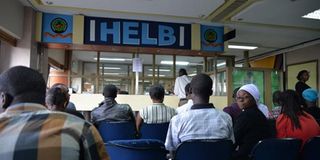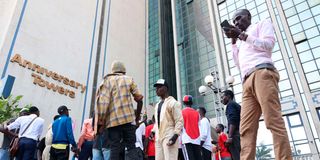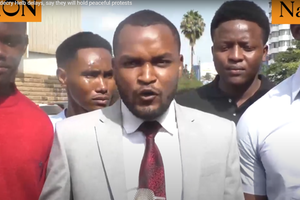
The Higher Education Loans Board offices in Nairobi.
Some 310,942 former students who benefited from funding for their education by the Higher Education Loans Board (Helb) have defaulted on loan repayments totalling Sh35.14 billion, it has been revealed.
Of these, 71,806 have already been negatively listed with Metropol and TransUnion credit reference bureaus (CRBs), potentially locking them out of access to credit facilities. However, 412,194 other individuals who have been repaying their loans have been listed positively for performing loans.
The amount owed to Helb by defaulters since 1975.
According to the CEO of the Helb, Geoffrey Monari, the amount owed is enough to fund the education of 289,000 students in universities and colleges for a full academic year.
The board awards study loans to deserving students for their upkeep as well as part of their tuition fees. Upon maturity, the loans are payable at an interest rate of four percent.
The details of the defaulters come at a time when the government is struggling to finance students in higher education as their numbers increase and Exchequer funding remains static. In the 2024 -2025 financial year, Sh35.9 billion had been budgeted for student loans through Helb.
Data from previous years indicates that the number of defaulters has been on a steady increase, which threatens the sustainability of Helb, which was conceptualised as a revolving fund.
11,117 students whose university education was funded by the government between 1975 and 1994, before HELB was created, owe Sh682.28 million.
Mr Monari revealed that the current total outstanding balance stands at Sh101.4 billion from 774,092 loan accounts of former beneficiaries.
“If all debtors paid their dues, HELB would reduce reliance on the National Treasury funding. It would expand access to higher education and institutional credibility would be strengthened,” Mr Monari said.
He added that 463,150 former students holding Sh66.26 billion in mature loans are currently repaying on a monthly basis.

University of Nairobi students protesting at Anniversary Towers in Nairobi which houses the Higher Education Loans Board on February 3, 2025 over delayed disbursement of funds.
President William Ruto had promised to “Restructure the Higher Education Loans Board (HELB) to offer interest-free loans,” in the Education Charter he signed with stakeholders during his campaigns for the presidency in 2022. Close to three years since coming to office, this has not been actualised.
Mr Monari told Nation that Helb, a key challenge that Helb faces in its debt collection, is a misconception that Helb loans are social or non-repayable. He also blamed high unemployment and underemployment rates for the inability of former students to repay their student loans.
Other reasons he cited are a rise in short-term and ‘gig’ employment that is difficult to track and migration of graduates to the diaspora.
“Helb uses a multi-pronged approach to debt collection. This includes statutory employer check-off system and strategic partnerships and data-sharing with institutions,” Mr Monari said.
Loanees are also sent periodic reminders, and penalty waivers are extended for lump sum payments. The board also engages loan guarantors to convince the loanees to repay their loans.
Mr Monari ruled out the possibility of writing off some of the loans, saying that it is beyond the mandate of Helb.
“The decision to write off loans lies with the National Treasury through the Ministry of Education, not Helb,” he stated.








